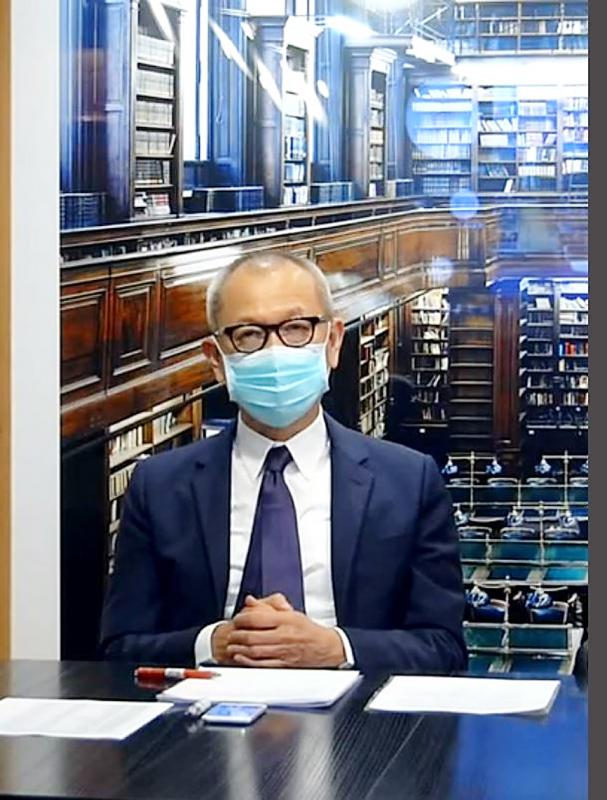Yageo Corp (國巨), the world’s No. 3 multilayer ceramic capacitor supplier, yesterday gave an upbeat business outlook for next quarter, as robust demand for high-end products has helped to lift its book-to-bill ratio and keep inventory healthy.
Premium passive components used in vehicles, and industrial and medical devices account for 75 percent of the company’s overall revenue, compared with 30 percent in 2017, after it spent two-and-half years optimizing its product and customer lineups, Yageo said.
Yageo’s goal is to boost that share to 80 percent by 2023, with revenue contributions from the automotive segment rising to 22 percent from 18 percent at present, Yageo chairman Pierre Chen (陳泰銘) told an online media briefing after the company’s annual general meeting in New Taipei City’s Xindian District (新店).

Photo: Chang Hui-wen, Taipei Times
“Yageo’s new structure is very different from that of the past,” Chen said. “We are no longer heavily dependent on the greater Chinese market to grow our business.”
Yageo is benefiting from growing demand for high-end passive components from Europe, Japan and the US, Chen said.
Last month’s sales were evidence of that, he said.
Sales last month increased 3.37 percent to NT$9.51 billion (US$339.73 million) from a month earlier, bucking a downtrend that was commonly seen in the past as Yageo’s Chinese customers entered inventory counting season in June.
The company said that its diverse product and customer portfolios have helped shield it from the ups and downs of the consumer electronics market.
Due to greater exposure to China’s consumer electronics market, Yageo’s global rivals saw their customers collecting excessive inventory due to poor sales in the market.
“We see that our customers have healthy inventory. Orders and customer demand are keeping good momentum,” Chen said. “We are still keeping our [book-to-bill] ratio at a high level. Growth momentum remains strong in the third quarter.”
Most production lines are running at more than 90 percent utilization, he said.
To cope with robust customer demand, Yageo expects capital spending to make up 33 percent of the company’s earnings before interest, taxes, depreciation and amortization this year, and 28 percent next year, before slipping below 20 percent in 2023.
Commenting on Yageo’s partnership with Hon Hai Precision Industry Co (鴻海) to make chips for electric vehicles, Chen said that it would help double Yageo’s revenue from Hon Hai.
Yageo shareholders yesterday approved a planned distribution of NT$10 per common share, including NT$2 per share from its capital surplus.
The firm reported earnings per share of NT$27.58 for last year.

Micron Memory Taiwan Co (台灣美光), a subsidiary of US memorychip maker Micron Technology Inc, has been granted a NT$4.7 billion (US$149.5 million) subsidy under the Ministry of Economic Affairs A+ Corporate Innovation and R&D Enhancement program, the ministry said yesterday. The US memorychip maker’s program aims to back the development of high-performance and high-bandwidth memory chips with a total budget of NT$11.75 billion, the ministry said. Aside from the government funding, Micron is to inject the remaining investment of NT$7.06 billion as the company applied to participate the government’s Global Innovation Partnership Program to deepen technology cooperation, a ministry official told the

Taiwan Semiconductor Manufacturing Co (TSMC, 台積電), the world’s leading advanced chipmaker, officially began volume production of its 2-nanometer chips in the fourth quarter of this year, according to a recent update on the company’s Web site. The low-key announcement confirms that TSMC, the go-to chipmaker for artificial intelligence (AI) hardware providers Nvidia Corp and iPhone maker Apple Inc, met its original roadmap for the next-generation technology. Production is currently centered at Fab 22 in Kaohsiung, utilizing the company’s first-generation nanosheet transistor technology. The new architecture achieves “full-node strides in performance and power consumption,” TSMC said. The company described the 2nm process as

Shares in Taiwan closed at a new high yesterday, the first trading day of the new year, as contract chipmaker Taiwan Semiconductor Manufacturing Co (TSMC, 台積電) continued to break records amid an artificial intelligence (AI) boom, dealers said. The TAIEX closed up 386.21 points, or 1.33 percent, at 29,349.81, with turnover totaling NT$648.844 billion (US$20.65 billion). “Judging from a stronger Taiwan dollar against the US dollar, I think foreign institutional investors returned from the holidays and brought funds into the local market,” Concord Securities Co (康和證券) analyst Kerry Huang (黃志祺) said. “Foreign investors just rebuilt their positions with TSMC as their top target,

POTENTIAL demand: Tesla’s chance of reclaiming its leadership in EVs seems uncertain, but breakthrough in full self-driving could help boost sales, an analyst said Chinese auto giant BYD Co (比亞迪) is poised to surpass Tesla Inc as the world’s biggest electric vehicle (EV) company in annual sales. The two groups are expected to soon publish their final figures for this year, and based on sales data so far this year, there is almost no chance the US company led by CEO Elon Musk would retain its leadership position. As of the end of last month, BYD, which also produces hybrid vehicles, had sold 2.07 million EVs. Tesla, for its part, had sold 1.22 million by the end of September. Tesla’s September figures included a one-time boost in